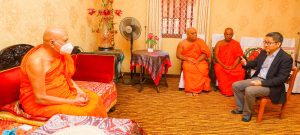Sudha Ramachandran

Chinese Charge d’Affairs in Colombo Hu We at a meeting with Buddhist monks of the Siam Nikaya in Kandy, Sri Lanka, January 11, 2023.
The Chinese government’s rather excessive response to an invitation extended by Sri Lankan Buddhist monks to the Dalai Lama to visit the island underscores yet again Beijing’s deep insecurities vis-à-vis the Tibetan leader. The incident also lays bare the open arm-twisting China indulges in with small countries to get them to toe its line.
According to reports, a group of senior Sri Lankan Buddhist monks who attended the Dalai Lama’s public sermon at Bodh Gaya in India on December 29-31 expressed interest in the spiritual leader visiting Sri Lanka.
The monks’ invitation to the Dalai Lama was reported in the Sri Lankan media. Before long, Chinese diplomats stationed in Colombo headed off to Kandy in the central highlands, where the Chargé d’Affaires of the Chinese Embassy in Colombo Hu Wei met the Mahanayake Thero of the Malwathu Chapter of the Siam Nikaya (a Buddhist monastic order), the Most Venerable Thibbatuwawe Sri Siddhartha Sumangala Thero.
According to a press release from the Chinese embassy, in the course of his “friendly conversation” with the monks Hu told them that the Dalai Lama “is not a ‘simple monk’ as he claims, but a ‘separatist’,” and a “political exile disguised as a religious figure who has long been engaging in anti-China separatist activities and attempting to split Tibet from China.”
Reminding the monks of “China’s firm support” to Sri Lanka, especially during the COVID-19 pandemic and the current economic crisis, Hu said that “both sides especially the Buddhist communities must prevent a sneaky visit of the Dalai Lama to the island to promote ‘Tibetan independence’.”
This was necessary to “safeguard the China-Sri Lanka historical relations from being damaged,” Hu said.
The message was clear. China’s relations with debt-trapped and dependent Sri Lanka would be “damaged” if the invitation to the Dalai Lama to visit Sri Lanka was not withdrawn.
Meanwhile, an official of the Tibetan government-in-exile said that the Dalai Lama did not intend to visit Sri Lanka. “At the moment, the Dalai Lama has no plans to visit Sri Lanka,” he told The Federal.
The Dalai Lama’s visits to countries across the world trigger objections from the Chinese government. In the case of India, where the Dalai Lama lives, his visits to Arunachal Pradesh in India’s Northeast, where China claims territory, have never failed to raise hackles in Beijing.
China punishes countries that welcome the Dalai Lama. In November 2016, when the Tibetan leader visited Mongolia, a Buddhist country where he is deeply revered, Beijing retaliated by imposing an economic blockade against the landlocked country.
China has pressured Sri Lanka on Dalai Lama-related issues in the past as well.
In December 2017, the Chinese embassy in Colombo reportedly pressured the management of Irida Lankadeepa, a Sinhalese newspaper, to stop the serialization of the Dalai Lama’s autobiography, “My Land and My People.” When the Sri Lankan Tibetan Buddhist Brotherhood Society organized photo exhibitions of the Dalai Lama, the Chinese embassy complained to the Criminal Investigations Department to probe the Society’s activities, Damenda Porage, its president, said.
China has objected to invitations to the Dalai Lama to visit the island in the past as well.
In 2015, months after a strongly pro-China government in Sri Lanka was defeated in elections, senior Sri Lankan monks during a meeting with the Dalai Lama in New Delhi “expressed a unanimous wish, shared by a large number of people in Sri Lanka, to see the Dalai Lama visit their country,” Tibetan Review reported.
“They can invite, but the government may not grant a visa,” a top official of the Sri Lankan foreign ministry told Reuters, adding that while “the Dalai Lama is very important,” Sri Lanka’s “close relationship with China is more important.”
“The Dalai Lama would be happy to visit but does not want to cause any inconvenience to the Sri Lankan government,” a senior aide of the Tibetan leader told Reuters amid the controversy in 2015.
The Dalai Lama did not visit the island in 2015, and the Chinese government lauded Sri Lanka for not providing “venues of connivance” to the Tibetan leader.
In 2015, Sri Lanka had already accumulated massive debts owed to China and was heavily dependent on it. But the situation it is in today is far worse; the country is in the grip of its worst economic crisis since its independence in 1948. Not only does it owe China billions of dollars but also, without Chinese support for its restructuring program, the IMF will not unlock its promised $2.9 billion loan to Sri Lanka to help in its economic recovery.
Under the circumstances, it is unlikely that the Sri Lankan government would have risked Chinese ire by allowing the Dalai Lama to visit. Thus, there was no need for the Chinese charge d’affaires in Colombo to rush to Kandy to meet the top prelate of the Malwathu Chapter of the Siam Nikaya.
In fact, even a phone call to the Sri Lankan foreign ministry warning against the Dalai Lama’s visit was unnecessary. After all, Sri Lanka knows the consequences.
Yet so deep are Chinese insecurities over the Dalai Lama and his popularity that it was unwilling to take a chance. Hence, the warning wrapped in the “friendly conversation” with the senior monks at Kandy.
No comments:
Post a Comment